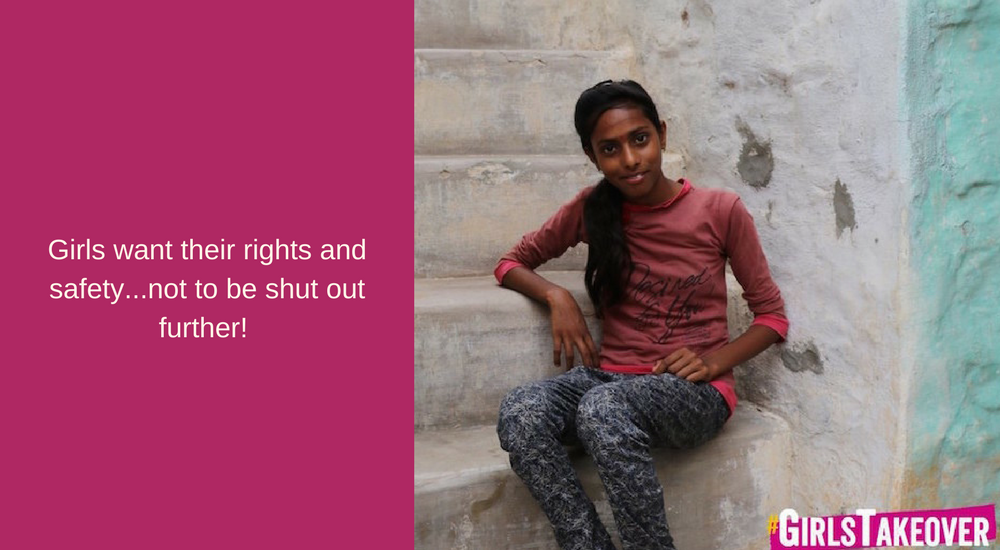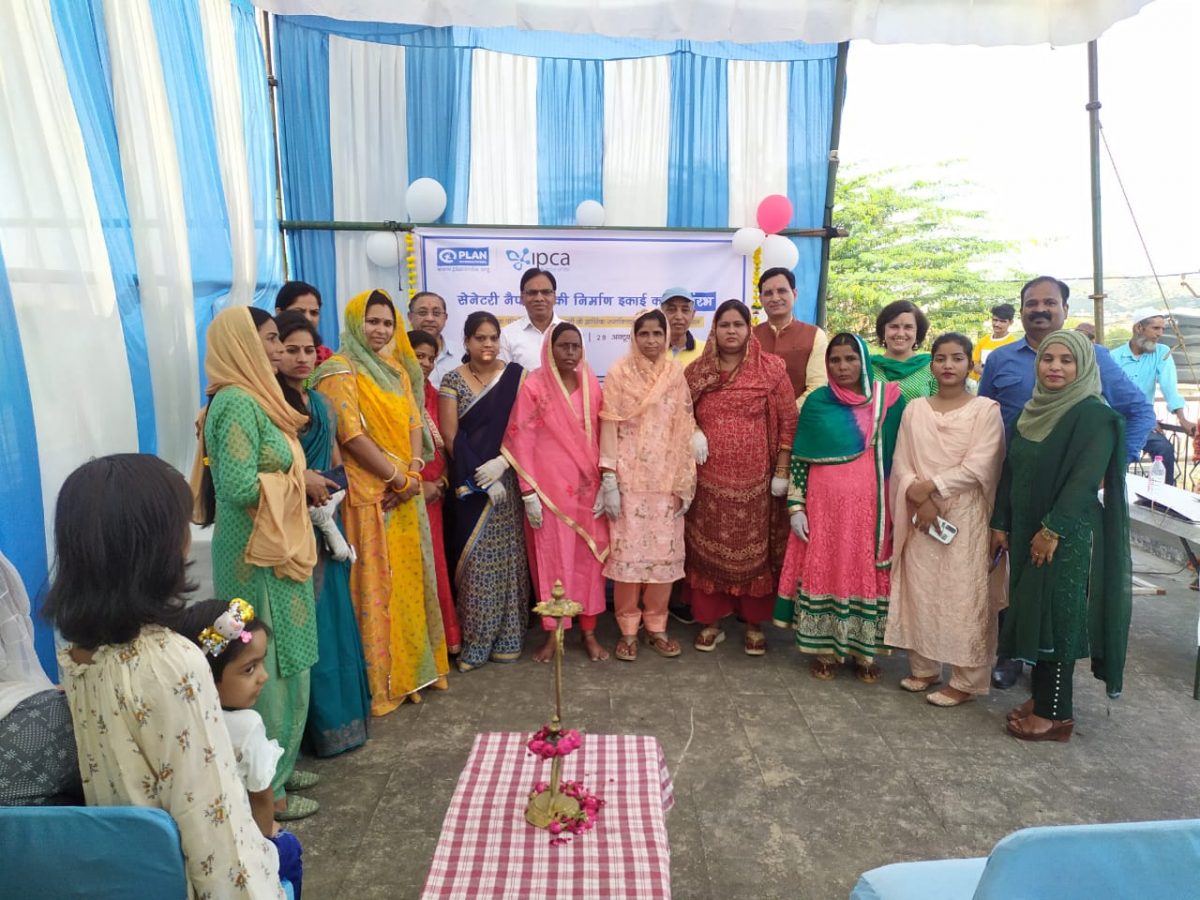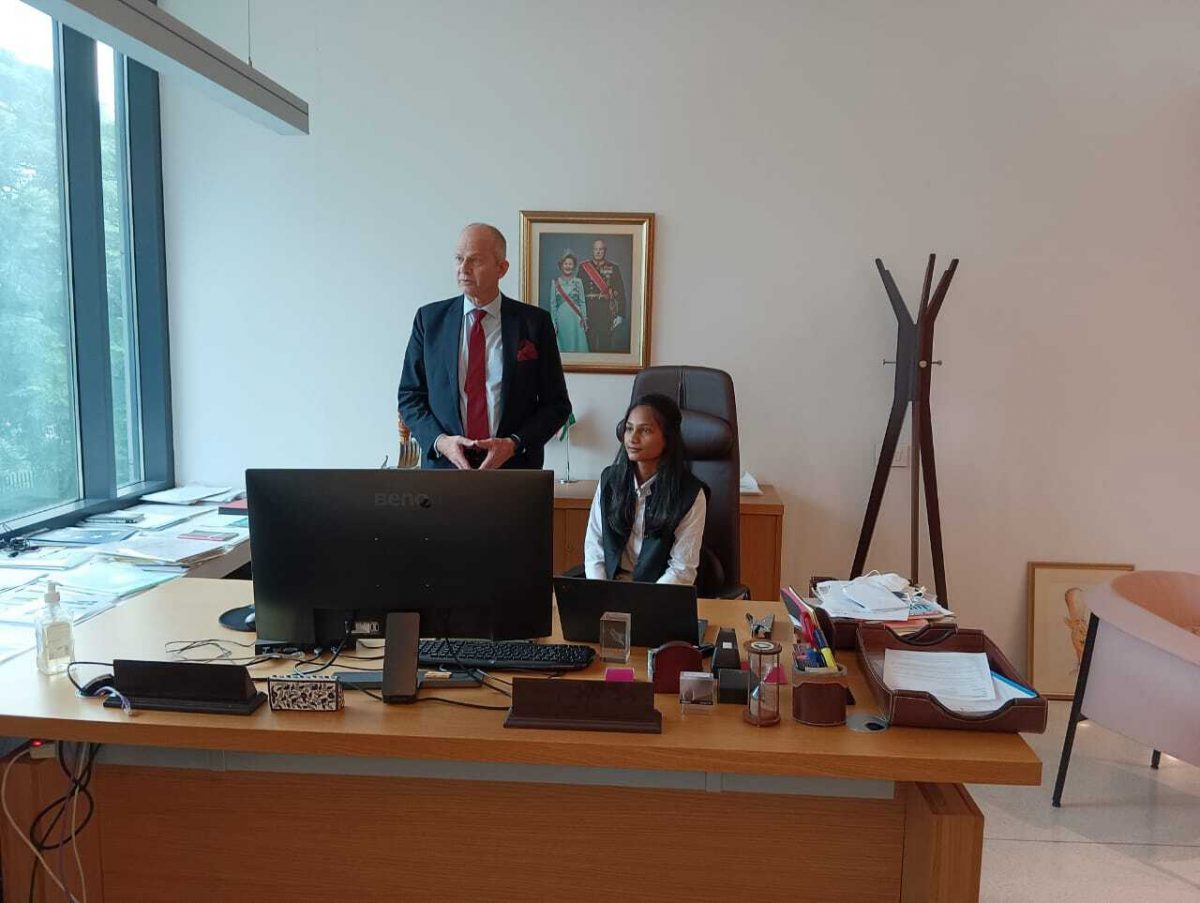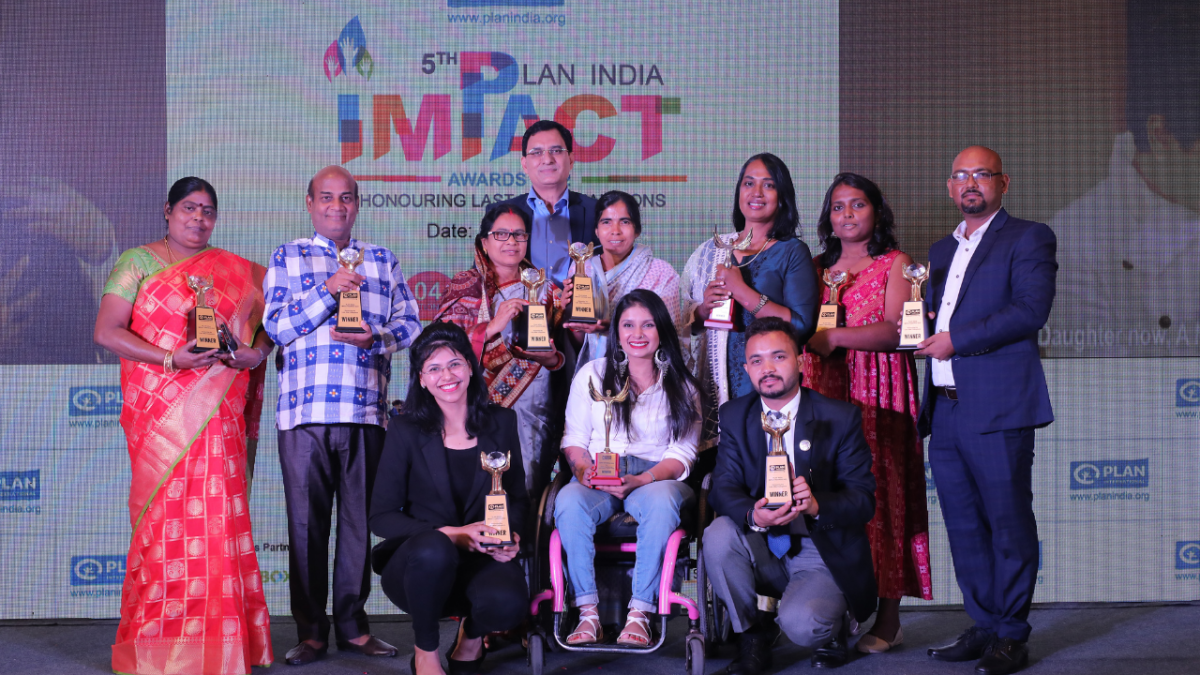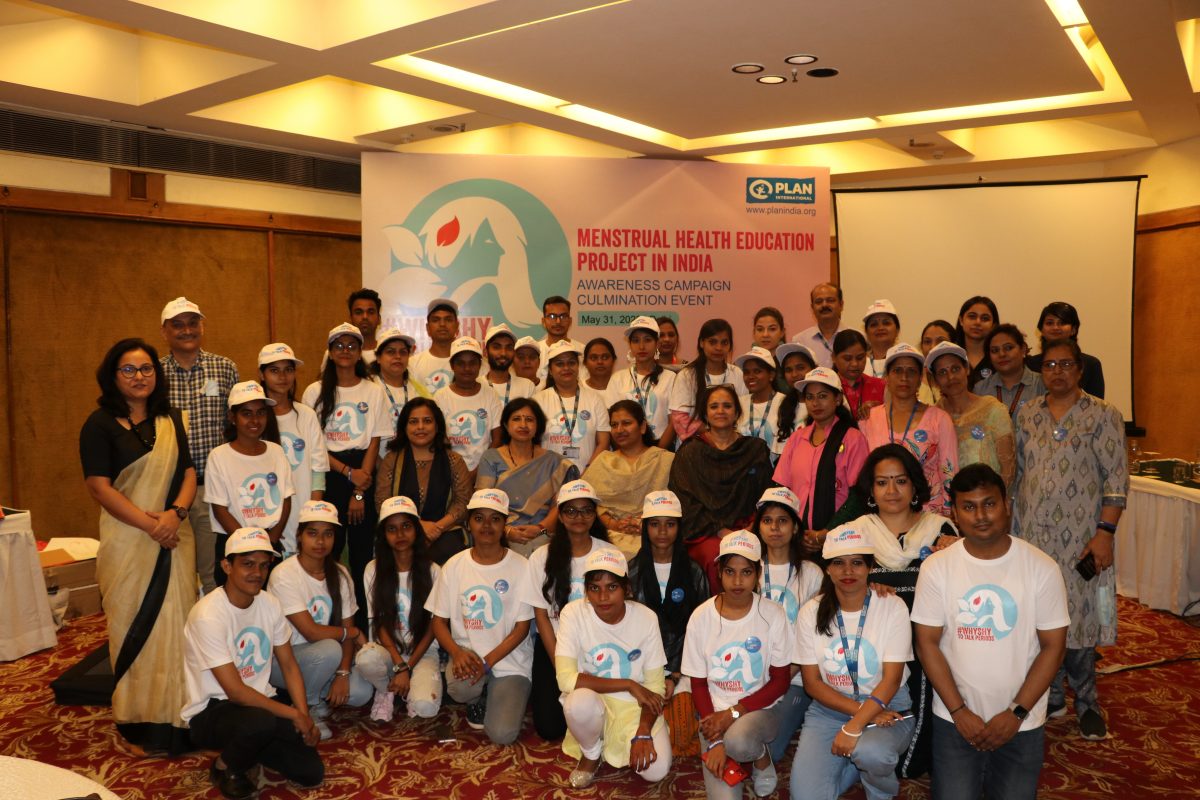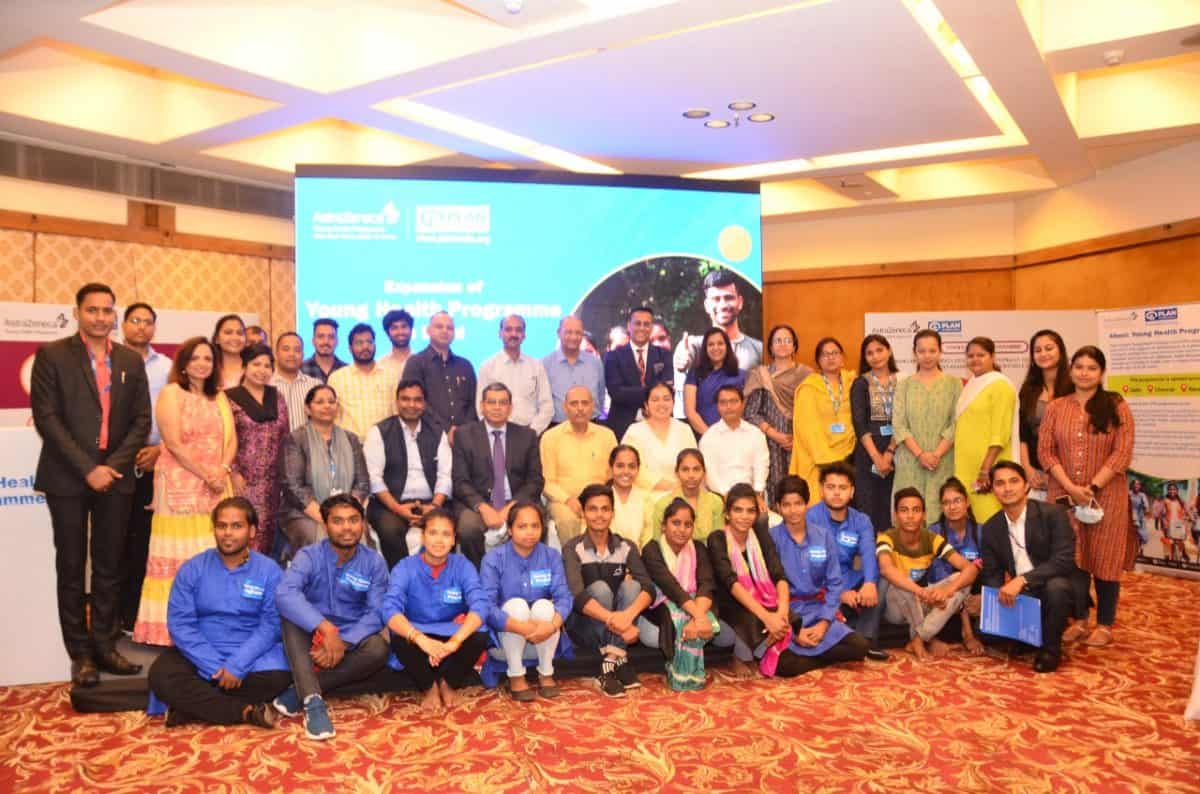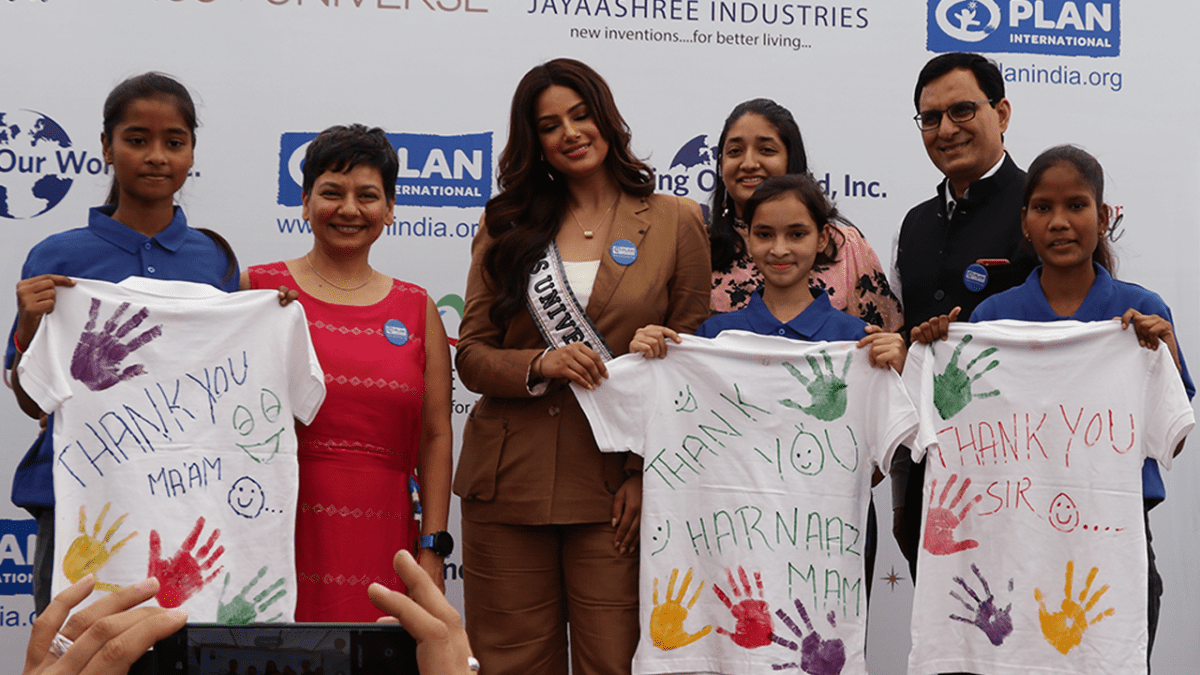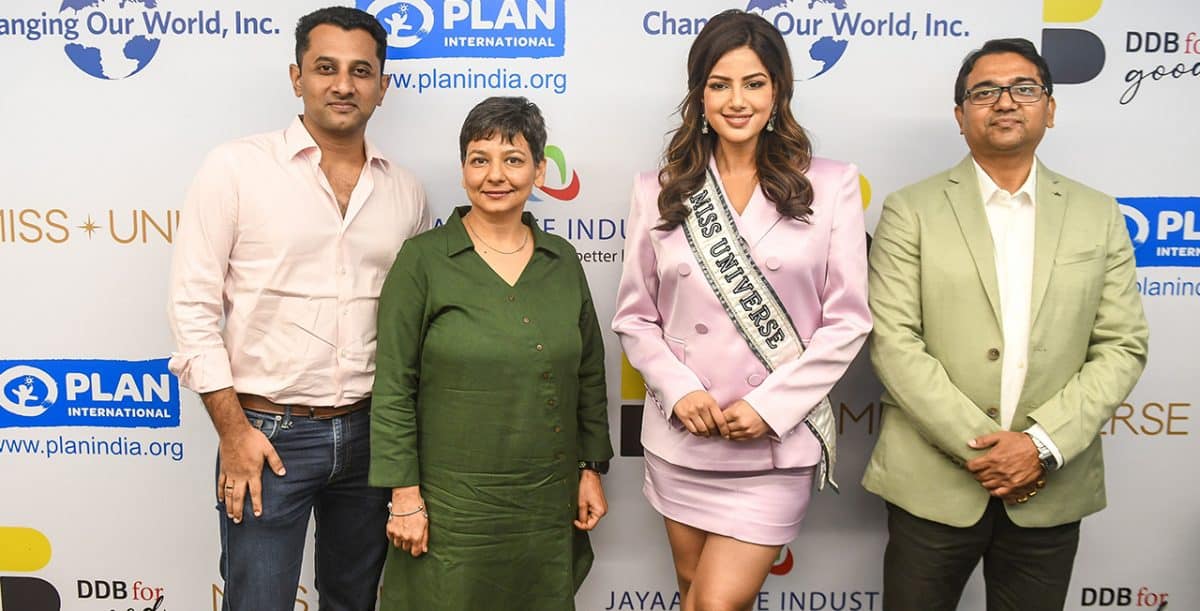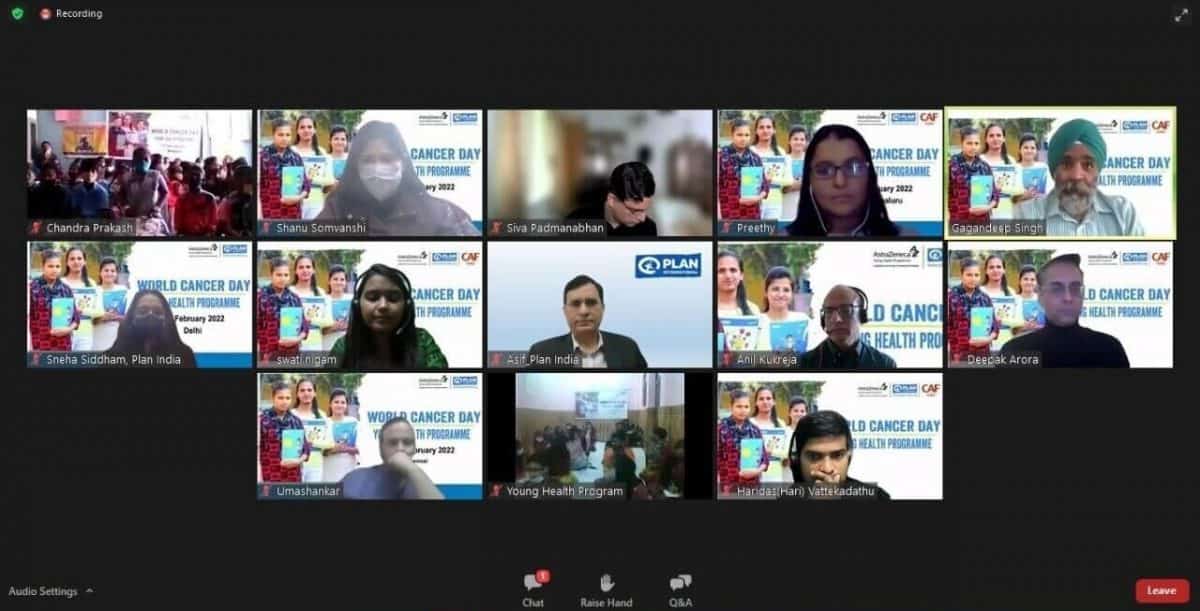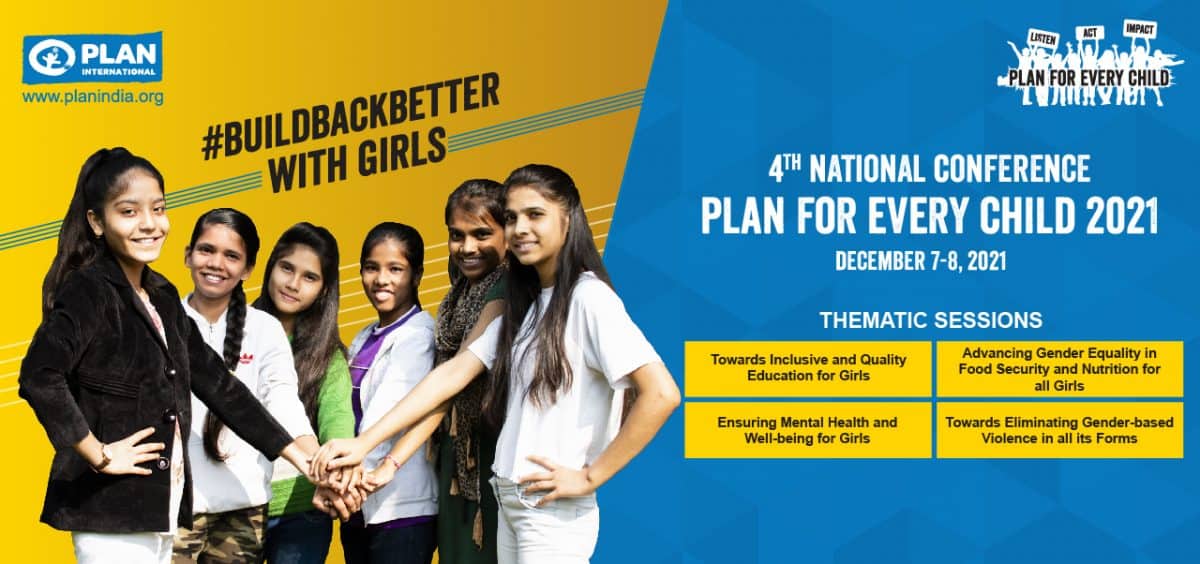Archives: Media Releases
Plan India and IPCA Laboratories launched the ‘Shakti’ project in Ajmer to economically empower and build entrepreneurial skills of young women from marginalized communities for dignified earning opportunities
Ajmer, 28th October 2022: For young girls and women from economically disadvantaged backgrounds, finding employment remains a distant dream. ‘Shakti’ is Plan India’s initiative to bridge this gap by providing vocational skill training for income generation to young women to help them become economically empowered.
The initiative was launched today with the unveiling of the manufacturing unit for sanitary napkins in the presence of Shri Premchand Godha, Chairman & Managing Director of IPCA Laboratories Ltd, senior officials of Plan India, well-known senior Chartered Accountant, Mr. Gopal Choudhary from Mumbai as well as distinguished guests from the local community and women from low-income groups. The manufacturing unit will be managed by an SHG from the Khanpura Women Group of Ajmer.
The ‘Shakti’ project will be implemented in Mumbai Slums, Ajmer, and Indore City. In Mumbai Slums, to provide income-generation opportunities for women, Plan India will provide sewing machines to these women and teach them tailoring and embroidery skills. Plan India will also establish low-cost sanitary napkin manufacturing enterprises in Indore and Ajmer. In addition to improving menstrual hygiene, the sanitary napkin units will help young girls manage their menstruation with dignity by increasing their access to low-cost sanitary napkins.
Within the next six months, Plan India will develop the skills of 300 women from the most vulnerable and excluded families in Tailoring and Embroidery to enable them to earn a living and become self-employed in 8 slums in Mumbai. Four sanitary napkin units will be established in Ajmer and Indore (two units each) as part of Plan India’s women empowerment interventions. Over 5,000 girls and women will be educated on issues of menstrual hygiene and management, increasing the use of 300,000 low-cost hygienic sanitary pads. In this way, Plan India will raise awareness of its commitment to achieving menstrual equity for 5 million women and girls by 2025.
Shri Premchand Godha, Chairman & Managing Director of IPCA Laboratories Ltd, said “Over the years, I have worked to build community capacities that can help make people self-reliant and change their surroundings and lives for the better. The initiative will not only help women from disadvantaged backgrounds become entrepreneurs, but it will also inspire young girls and women to think beyond housework and generate income. By involving women from the community, we will be able to address matters of menstrual hygiene management and ensure their safety and health”.
Mohammed Asif, Executive Director, Plan India, said, “It’s a proud moment for all of us at Plan India today as we see our dream come true for enabling young women from marginalized communities to become economically empowered. Through various initiatives, we have been working to encourage young people, especially women, to pursue decent work opportunities, whether they are employed or self-employed. The ‘Shakti’ project will not only improve women’s skills but would also be a catalyst for addressing issues dealing with menstrual hygiene and uncovering myths and misconceptions. Additionally, it will assist in increasing the use of safe, hygienic, and sanitary pads by young girls and women so that they can participate in sustainable, environmentally and socially friendly menstruation hygiene management practices.”
Celebrating the 10th International Day of the Girl: Plan India’s Young Girl Changemakers Takeover Influential Leadership Positions For Advancing Girls’ Rights and Gender Equality
New Delhi, October 11th, 2022: Committed to strengthening the girls’ rights and gender equality space over the past decade, Plan India’s Girl Changemakers stepped into the leadership roles across Diplomatic Missions, Corporates, and Government bodies on the International Day of the Girl. Through these symbolic takeovers, these highly driven gender champions will break gender stereotypes, encourage positive discourses, challenge discriminatory social norms, and mobilise people for a more gender equitable society.
Girl Changemakers from ten Plan India’s intervention states, including Rajasthan, Bihar, Jharkhand, Uttar Pradesh, Uttarakhand, Odisha, Maharashtra, Karnataka, Tamil Nadu and Delhi, showed strength and leadership and brought attention to the significance of girls having the right to decide on things that concern them. They showcased their potential as agents of change and engaged in meaningful and contributory dialogues to advance the cause of girls’ rights and equality.
Celebrating the 10th year of International Day of the Girl (IDG), Plan India released an anthem for girls on its social media channels. It aims to rally support and solidarity for an equal world where girls can aspire to become future leaders by highlighting #GirlsRiseHigh and mobilise key stakeholders’ support to ensure equal access to education, healthcare, and livelihood opportunities for them.
Mohammed Asif, Executive Director, Plan India, said, “Plan India has been supporting and nurturing the social spaces in which girls take centerstage, are listened to and valued as equals. We believe it is important for all girls to be confident and capable of addressing and overcoming the gender norms, expectations, and stereotypes that have hold them back from achieving their full potential in their family and community. In India, millions of girls are now empowered and moving forward to achieve their aspirations and ambitions. However, there are still many who need our support and enablement. The International Day of Girl 2022 is yet another occasion for all of us to join hands with the girls, who are keen to take action and improve their own lives and pursue their dreams and ambitions.
Plan India is honored to have had the opportunity to support more than 1,00,000 girls and young women to make their own decisions on education, health, and livelihoods. We will continue to encourage girls to lead the process of challenging gender stereotypes and improving their status. When girls and young women hold prominent positions in their professions, they can amplify their voices and inspire others to do better in life.”
Girl Changemaker, Parul from New Delhi, commented on the Takeover initiative, “International Day of the Girl is dedicated to all girls who have strived for and achieved their dreams. The takeover initiative not only gives us a chance to be heard and understood, but also provides us with opportunities to grow. Taking part in such initiatives will empower girls to be independent, confident and self-sufficient.”
In 2011, Plan led the global effort to build a coalition of support behind IDG, securing backing from the Canadian government which took this request to the United Nations. Over the years, Plan has worked with girls and multi-sectoral partners alike to launch global actions on girls’ rights. Thus, every year on IDG, girls from Plan India supported communities take over leadership roles in political, economic, corporate and social spaces, stepping into the shoes of influential leaders and experts, fulfilling their responsibilities, and demonstrating their power and potential to lead the way into the future.
#GirlRiseHigh
Girls Rise High is Plan India’s national campaign for girls’ and young women’s voice, power, and leadership. Girls are held back by gender inequalities, multiple and intersecting forms of discrimination, and systemic oppression that prevents them from being leaders in public life. Girls want to be part of the decisions that shape their lives. Girls know the challenges they face and the changes they need.
Valuing girls and young women as actors is critical for transforming communities and shaping gender-equal societies. National and community decision makers must support girls and young women to Rise High by making commitments to open, safe, inclusive pathways for them and their networks to have equal access to education, health, and livelihood opportunities.
Plan India Impact Awards 2022 honoured last mile champions and changemakers for their exceptional contributions toward community development
New Delhi, July 23rd 2022: Plan India, a not-for-profit organisation striving to advance children’s rights and equality for girls, today announced the winners of the 5th Edition of Plan India Impact Awards 2022 to honour the last-mile champions including frontline workers, youth leaders and changemakers for their outstanding efforts in ensuring the development and delivery of basic services for children, adolescents, women and men across all districts in our country.
Building on the success of the previous four editions, the Awards have bolstered sustainable development by recognising the efforts of incredible last-mile champions and inspired several others to follow the suit and build resilient communities. As part of Plan India’s rigorous selection process, nominations are assessed and shortlisted at three levels: first by a third-party expert agency, then by a panel of sectoral experts, followed by the final selection of winners by the National Jury which is composed of eminent personalities with extensive sectoral experience from the government, corporate sector, and development sector.
Among the eight categories, C. Ambiga, from Puducherry was awarded for her contribution as the best Anganwadi Worker; Rebati Sahoo from Odisha won in the ASHA/ANM worker category; Chid Welfare Committee (Lucknow), Ravinder Singh Jadon was declared winner in the best Child Welfare Committee category; Rajni Kant Singh from Bihar was felicitated as the best Community Volunteer (including COVID Warrior); and Panitar Pally Unnayan Samiti from West Bengal was recognized as the best Women Self-Help Group. Palak Agarwal and Lalit Kumar Dogra took the limelight as the best Young Changemakers in the female and male categories respectively. For the Special Award category- Last mile champions for girls’ rights, Deepa Pawar from Maharashtra was recognised as the winner.
This year, Plan India also launched a Special Award for the Best Digital Champion for Girls’ Rights to recognize and felicitate girls and young women who leverage the power of social media to advance girls’ rights and women empowerment. Under the Special Award, Virali Modi was announced as the Golden Wings winner and Kalki Subramaniam bagged the Silver Wings winner title.
Speaking on the occasion, Mohammed Asif, Executive Director at Plan India said “Since 2017, Plan India Impact Awards has celebrated the dedication and hard work of millions of frontline development workers and community volunteers who have made their villages and communities better. It’s heart-warming to see the involvement of all stakeholders who have joined hands to appreciate and inspire thousands of development workers and social innovators to work harder and be the catalyst for change. This year, along with recognizing the village and community changemakers, we also introduced the Special Award for the best Digital champion for girls to honour and recognize young women and girls who have leveraged technology for the betterment of lives of millions of girls in our country.”
Plan India Impact Awards
The Plan India Impact Awards were envisioned to recognise the last-mile champions, motivate them to continue their life-changing work, and reinforce and replicate their best practices for enhanced programme delivery and sustainable development across the country. Instituted in 2017, Plan India Impact Awards are now an annual recognition of the positive contribution of frontline workers, changemakers, and community volunteers.
Over the course of four editions, we have received more than 2000 noteworthy nominations. This year, we received over 580 remarkable applications from selfless changemakers at the forefront of driving social change.
PLAN INDIA CELEBRATES THE CULMINATION OF ITS 28-DAY CAMPAIGN #WHYSHY TO TALK PERIODS
May 31, 2022, New Delhi: Plan India today celebrated the culmination of its 28-day campaign #WHYSHY To Talk Periods which sensitised around 28,000 adolescent girls and boys on menstrual health education and hygiene management in over 300 schools across Jharkhand and Delhi. The campaign focused on building the knowledge and confidence of girls in their ability to manage menstrual health and hygiene with safety and dignity.
The culmination event was attended by Dr. Sushma Dureja, Senior Chief Medical Officer, Ministry of Health and Family Welfare, Govt. Of India, Ms. Ranjana Prasad – Member of the Delhi Commission for Protection of Child Rights, Dr. Rupali Goyal – District Program Officer (RCH) -Delhi (East), Directorate of Family Welfare, GNCT of Delhi.
Highlighting the need to increase menstrual health awareness among communities, especially adolescent girls and young women, the campaign challenged social myths and taboos surrounding puberty to end menstrual-related stigma and discrimination. It highlighted 28 stories of the first menstruation of girls from its communities as messages to spread awareness on menstrual hygiene management and breaking the silence.
Apart from educating girls about hygiene management, the campaign also spoke of how they should dispose of menstrual waste. The majority of girls lack education about the importance of cleaning, drying, and storing absorbents hygienically, as a result, they suffer from reproductive tract infections.
“We need to challenge the misconceptions around menstruation. During these 28 days, we reached out to girls in our schools and communities about the importance of maintaining hygiene during periods. Additionally, we encouraged them not to be ashamed of talking about their periods. This is a natural phenomenon that needs to be discussed openly within our families and society,” said Anchal, Plan India’s Peer Educator from Delhi.
“Plan India believes that menstrual equity can be achieved by promoting gender equality, addressing the taboos and misconceptions on menstrual hygiene and creating access to menstrual health products for all women and girls. Our adolescent girls’ health and ending period poverty initiative is led by girls themselves and seeks to promote dignity, safety, and confidence for all girls and young women enabling them to lead healthier and happy lives” said Mohammed Asif, Executive Director, Plan India.
#WHYSHY To Talk Periods was launched on May 4, 2022, under Plan India’s ‘Menstrual Health Education Project in India’. The project is being implemented in partnership with Kimberly-Clark Corporation, USA, in 3 resettlement colonies/urban slums in the national capital of Delhi and the Hazaribagh district of Jharkhand. It aims to increase the knowledge and confidence of adolescent girls and young women in their ability to manage menstrual health and hygiene.
AstraZeneca expands its ‘Young Health Program’ in Delhi; opens 3 Health Information Centres in the communities of Sangam Vihar and Dakshinpuri
For over a decade, AstraZeneca and Plan India’s Young Health Program has been generating awareness and identifying sustainable solutions to influence the behaviour of youths against Non-Communicable Diseases
New Delhi: AstraZeneca India, a science-led biopharmaceutical company, together with Plan India, an NGO striving to improve the lives of millions of children and young people, today announced the expansion of their flagship CSR initiative, Young Health Program by opening 3 Health Information Centres (HIC) in Delhi across the communities of Sangam Vihar and Dakshin Puri. The flag off event organised at The India Habitat Centre saw a participation by senior dignitaries from the Ministry of Health & Family Welfare, Ministry of Youth Affairs and Sports, Directorate of Family Welfare, NCD Cell, MCD North, beneficiaries from the multiple under-resourced communities, Plan India and AstraZeneca India.
‘Young Health Programme’ aims to reduce the growing burden of non-communicable diseases on health systems with a focused approach to bring about a behaviour change specifically amongst youth from 10-24 years of age. Present at the expansion program, Dr Zoya Ali Rizvi, Deputy Commissioner, MOHFW, Govt of India, said, “It’s high time to focus more on NCDs as it’s a grim reality that the burden of NCDs on India is long-lasting given that more than 65% of the individuals suffering from NCDs are in the most productive life age groups i.e., between 26-59 years. Healthcare initiatives like YHP, undertaken at a community level, contribute significantly to arrest this trend and to provide equitable access to healthcare to people”.
The announcement was accompanied by a theatrical presentation of the positive effects of the programme work in the communities of Bawana, Holambikalan, and Badarpur in Delhi over the past decade. A group of about 15 beneficiaries, peer educators and youth from grassroot communities recreated an engagement tool that is used to draw attention to the cause and raise awareness on the ground.
The programme specifically focuses on educating youth on the ill-effects of tobacco, alcohol through peer pressure. Involving youth from the target communities itself, the programme undertakes a community-based approach to develop them into peer educators who in-turn shoulder the responsibility of expanding the message to the entire community. Thus far, YHP directly reached more than 460,000 young people with health information and trained more than 7,800 peer educators who have delivered numerous health promotion activities from time to time. In the year 2019, the program was expanded to Tamil Nadu in addition to Delhi, with 2 HICs followed by its expansion to Karnataka with 3 HICs in Bengaluru.
On the occasion, Gagandeep Singh, Managing Director AstraZeneca India said, “The launch of YHP in Delhi a decade back marked the vantage point for our global community investment initiatives in India, focused on empowering and sensitizing youngsters to be able to make healthier choices. With about 21 HICs now across Delhi, Tamil Nadu and Karnataka, we aim to continue delivering accurate health information and encourage adoption of healthy practices amongst the youth. We are extremely thankful to the health authorities and our partners who have been with us on this journey to lay a strong foundation of this program in the country”.
Mohammed Asif, Executive Director Plan India said, ” Since 2010, Plan India’s Young Health initiative has been improving health behaviors among adolescents and young people with the support of AstraZeneca. Our efforts in NCD prevention have reached a critical stage to be able to work with government initiatives such as RKSK, and we are now expanding to Sangam Vihar and Dakshinpuri in order to reach 164,000 adolescents and young people with an innovative peer educator model and a youth-led health information center. Having seen significant improvements in high-risk areas in Delhi, reaching out to new areas is yet another initiative to combat the high prevalence of risk behaviors associated with NCDs, such as tobacco use, alcohol abuse, poor eating habits, and inactive lifestyles.”
YHP aims to reduce the uptake of unhealthy behaviours in young people to improve their health outcomes as adults and help address the growing burden of NCDs on health systems. Globally thus far, YHP has reached more than 8 million young people in more than 30 countries around the world. In 2020, AstraZeneca made a global commitment of $35 million to renew the YHP for another 5 years and set new and ambitious goals. From 2021 to 2025, the YHP aims to reach 10 million more young people with health information in countries around the world.
In a direction to create a multi-faceted impact, AstraZeneca is complementing the YHP with ‘New Normal Same Cancer’ and ‘Ganga Godavari Initiative’ that focuses on creating a mass scale awareness on cancers with the help of ambassadors and partners such as Indian Cancer Society and Banaras Hindu University. Under these initiatives, multiple cancer screening camps are conducted in the remote areas of the country where not many facilities are available.
About the Young Health Programme: AstraZeneca’s Young Health Programme (YHP) is a global programme with a unique focus on young people age 10 to 24 and prevention of the most common non-communicable diseases (NCDs): cancer, diabetes, heart disease, respiratory disease and mental ill health. Delivered in partnership with Plan International and UNICEF and informed by research from the Johns Hopkins Bloomberg School of Public Health, YHP aims to support the development of protective environments and empower young people to make informed choices about their health. YHP is part of our sustainability commitment to use our capabilities to make the most meaningful impact where society needs it -health.
About AstraZeneca Pharma India Limited: AstraZeneca is a global, science-led biopharmaceutical company that focuses on the discovery, development and commercialisation of prescription medicines, primarily for the treatment of diseases in three therapy areas – Oncology, Cardiovascular, Renal & Metabolism and Respiratory. AstraZeneca operates in over 100 countries and its innovative medicines are used by millions of patients worldwide. AstraZeneca India has a workforce of over 1,400 employees across the country committed to deliver great medicines to patients through innovative science and global excellence in development and commercialisation.
Plan India and Miss Universe 2021 Harnaaz Sandhu visit local community to bring menstrual equity to 5 million girls and young women by 2025
India I 26 March, 2022: Plan India and Miss Universe 2021 Harnaaz Sandhu today visited Mahipalpur, New Delhi to donate a machine that will help produce sanitary menstruation products, as part of their newly launched initiative earlier this week. Sandhu and Plan India Executive Director Mohammed Asif greeted local women and girls from Plan India communities and educated them on the importance of menstrual health and equity, as well as breaking the stigma around menstruation.
Earlier this week, Plan India along with Miss Universe Organization, Miss Universe 2021 Harnaaz Sandhu, the social entrepreneur Arunachalam Muruganantham aka Pad Man, and social impact agency DDB For Good announced a global coalition to advance menstrual equity for girls and young women. Plan India committed to be the on-the-ground NGO partner to help achieve the coalition’s goal of menstrual equity for 5 million women and girls by 2025 in the India pilot program. DDB For Good, DDB Mudra Group’s dedicated social impact agency, in partnership with Changing Our World, will use public mobilization and creative storytelling to raise funds for the platform. Both agencies are part of the Omnicom Group.
As part of striving for adolescent girls’ health and ending period poverty, Plan India works for Menstrual Hygiene Education and Management in the country to ensure that girls are able to manage menstruation safely. They aim to target all genders to transform the way they think about menstruation, resulting in a positive change in attitude, including stigma related to menstrual health and hygiene.
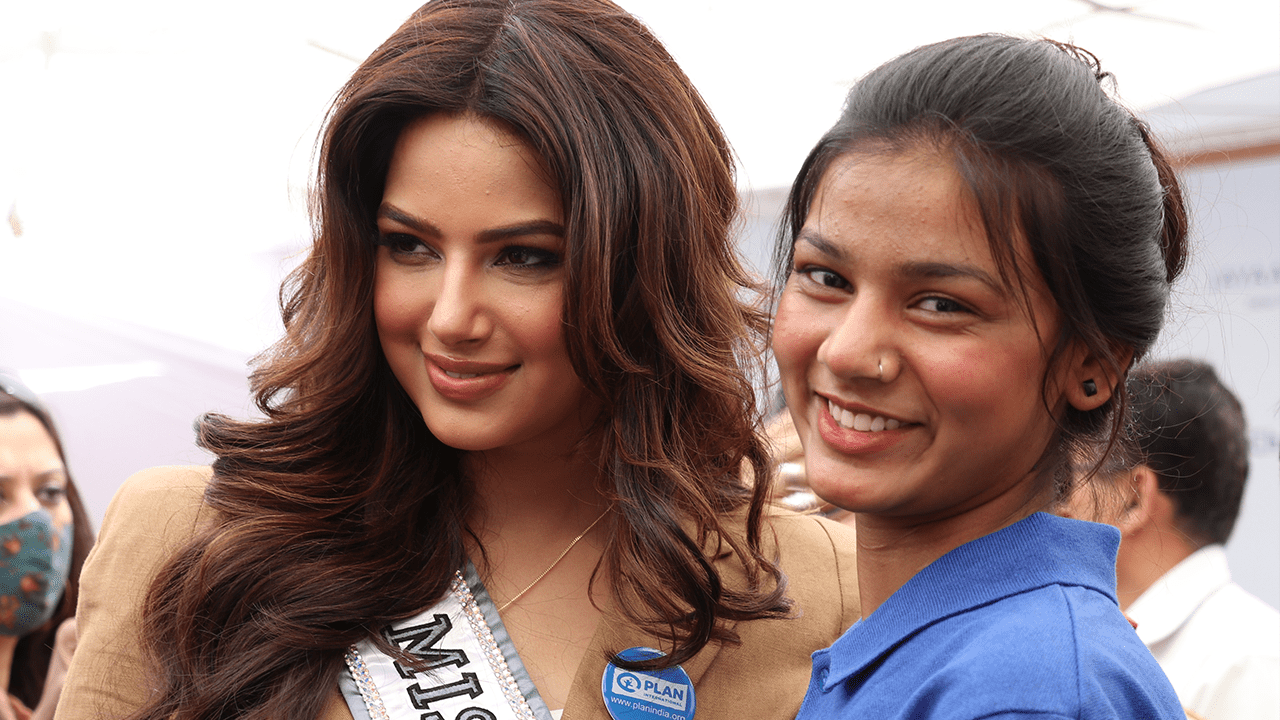
“It was so powerful to meet some of the women and girls who will benefit from this program,” said Miss Universe 2021 Harnaaz Sandhu. “Every woman around the globe should be able to manage her menstruation with dignity, safety and confidence, and I’m thrilled to be able to be here today as we start our coalition’s on-the-ground outreach, and donate the program’s first machine to a community in need.”
The endeavor will begin in India, where 62% young women and girls do not have access to safe menstrual care, with plans to take the initiative international in the coming years. Nearly 500 million individuals worldwide are experiencing period poverty and the coalition’s multi-million dollar fundraising goal will be used to make measurable impact across several fronts: reducing the stigma and raising awareness, education, policy and access to sustainable resources and products for menstrual equity.
Expressing gratitude at the on-ground launch of the ‘Advancing Menstrual Equity for all Girls and Women in India’ Project, Mohammed Asif, Executive Director, Plan India said, “It’s a proud moment for us to be a part of this coalition, and to see Miss Universe 2021, Harnaaz Sandhu meet our young girls and commit herself to the noble cause. Menstrual equity remains a distant dream for at least 3 out of 5 girls and women in our country. Plan India has been working relentlessly for the past three decades in partnership with girls, women’s groups and other development actors to advance girls’ rights and gender equality. We are confident that this coalition will lead to a national as well a global movement to achieve menstrual equity for girls and women.”
Shally Mukherjee – Founder & Head, DDB For Good says “The issue of period poverty is multi-faceted. Lack of access to hygienic and affordable sanitary protection is at the heart of it. One of our key objectives is to create a regular access to affordable pads for these communities. The setting up of these machines not just does that but also creates livelihoods in the community. Today was just the beginning.”
About DDB For Good
DDB For Good is a social impact agency based out of Mumbai. A part of the DDB Mudra Group, DDB for Good specialises in mobilizing collaborations to bring together influence, resources and expertise for meaningful and at-scale impact. The agency has expertise in branding, storytelling, fundraising and mobilising support through media interventions. DDB For Good works with corporates, NGOs, fundraisers, social impact organisations and philanthropists. To bring in global expertise, DDB For Good partners with Changing our World, an Omnicom agency.
About The Miss Universe Organization (MUO)
The Miss Universe Organization (MUO) is a global community that empowers women to realize their goals through experiences that build self-confidence and create opportunities for success. MISS UNIVERSE®, MISS USA®, and MISS TEEN USA® programs provide the 10,000 women who participate annually an international platform to affect positive change through influential humanitarian and professional efforts. The contestants and titleholders are leaders and role models in their communities, develop personal and professional goals, and inspire others to do the same. MUO is a subsidiary of Endeavor, a global sports and entertainment company. For more information, visit www.missuniverse.com.
Miss Universe Organization, Plan India, DDB For Good, and Social Entrepreneur Pad Man launch global coalition to advance menstrual equity
India | 22 March, 2022: The Miss Universe Organization (MUO), reigning Miss Universe 2021 – Harnaaz Kaur Sandhu, social entrepreneur Arunachalam Muruganantham aka Pad Man, social impact agency DDB For Good and humanitarian organization Plan India today announced a coalition and social impact alliance to create a platform for menstrual equity. Plan India will act as the on-ground NGO partner to help achieve the coalition’s goal of menstrual equity for 5 million women and girls by 2025 in the India pilot program. DDB For Good, DDB Mudra Group’s dedicated social impact agency, in partnership with Changing Our World, will use public mobilization and creative storytelling to raise funds for the platform. Both agencies are part of the Omnicom Group.
The endeavour will begin in India, where 62% young women and girls do not have access to safe menstrual care, with plans to take the initiative international in the coming years. Nearly 500 million individuals worldwide are experiencing period poverty and the coalition’s multi-million dollar fundraising goal will be used to make measurable impact across several fronts: reducing the stigma and raising awareness, education, policy and access to sustainable resources and products for menstrual equity.
Harnaaz Kaur Sandhu secured the national title of LIVA Miss Diva Universe 2021 and went on to the international stage, to win Miss Universe 2021. Speaking about the coalition, Miss Universe 2021 – Harnaaz Kaur Sandhu said, “I am so proud to help launch this initiative. Because my mother is a gynaecologist, I have been aware of the menstrual inequity in my country for most of my life. Now I can help carry on her work by bringing awareness to this amazing coalition of individuals and organizations who are working together to end the stigma, educate the public, and provide access to necessary products.”
Padma Shri awardee Arunachalam Muruganantham, better known as Pad Man believes that “Gender equality can be achieved by bringing proper menstrual hygiene awareness among girls and women.” He will help the coalition set up affordable manufacturing units in geographies and communities most affected by period poverty, run by women and girls themselves.
Shally Mukherjee – Founder & Head, DDB For Good says, “At DDB For Good and Changing Our World we are truly honoured to be a part of this opportunity to create a global and at-scale impact. The issue of menstrual equity has been very close to our hearts for years, and it is reflected in some of the culture changing work that we have done in the past. Our belief is very simple – collaborations with a shared commitment is the only way to truly scale up efforts that bring a meaningful change.”
Mohammed Asif, Executive Director, Plan India said, “Menstrual equity remains a distant dream for at least 3 out of 5 girls and women in our country. Plan India has been working relentlessly for the past three decades in partnership with girls, women’s groups and other development actors to advance girls’ rights and gender equality. Period poverty is one of the primary reasons that holds back girls and women to achieve their full potential. We are thrilled to join hands with Miss Universe 2021 – Harnaaz Kaur Sandhu, Miss Universe Organisation, Pad Man, DBB For Good and Changing Our World, to create a national and global initiative to achieve menstrual equity for girls and women by 2030. We have yet another reason to act together and no time to lose.”
Additional Key Statistics & Sources | Source Link: WIIS
- Of the people who menstruate, at least 500 million experience period poverty every month.
- In a study done by the Tamil Nadu Urban Sanitation Support Programme (TNUSSP) in two Tamil Nadu villages, 84% of girls reported that they experienced “fear, panic, and confusion” during their first menstruation because they were never taught what menstruation is or how to prepare for it.
- In India, nearly 40% of students miss school during menstruation, and 1 in 5 drops out of school after their first menstruation cycle begins.
- A survey conducted by US a menstrual product company showed that 1 in 5 girls in the United States reported having missed school because they did not have access to menstrual products
- A report from Plan International showed that of the health professionals they surveyed across 30 different countries, 78% reported that there was “restricted access to [menstrual hygiene] products, through shortages or disrupted supply chains” as a result of the pandemic.
- A study found that 71% of girls in India 5 report having no knowledge of menstruation before their first period.
- Almost 88% of women and girls in India use homemade alternatives, such as an old cloth, rags, hay, sand, or ash.
- Girls with special needs and disabilities disproportionately do not have access to the facilities and resources they need for proper menstrual hygiene.
About DDB For Good
DDB For Good is a social impact agency based out of Mumbai. A part of the DDB Mudra Group, DDB for Good specialises in mobilizing collaborations to bring together influence, resources and expertise for meaningful and at-scale impact. The agency has expertise in branding, storytelling, fundraising and mobilising support through media interventions. DDB For Good works with corporates, NGOs, fundraisers, social impact organisations and philanthropists. To bring in global expertise, DDB For Good partners with Changing our World, an Omnicom agency.
About The Miss Universe Organization (MUO)
The Miss Universe Organization (MUO) is a global community that empowers women to realize their goals through experiences that build self-confidence and create opportunities for success. MISS UNIVERSE®, MISS USA®, and MISS TEEN USA® programs provide the 10,000 women who participate annually an international platform to affect positive change through influential humanitarian and professional efforts. The contestants and titleholders are leaders and role models in their communities, develop personal and professional goals, and inspire others to do the same. MUO is a subsidiary of Endeavor, a global sports and entertainment company. For more information, visit www.missuniverse.com.
WORLD CANCER DAY: PLAN INDIA AND ASTRAZENECA SIGNS A MOU TO DELIVER PUBLIC AWARENESS CAMPAIGN ON PREVENTION OF NCDS – SPECIFICALLY CANCER IN BANGALORE
Bengaluru: This World cancer day, AstraZeneca, a science-led biopharmaceutical company, and Plan India, an NGO striving to improve the lives of millions of children and young people, signed an MoU to expand its ‘Young Health Programme’ (YHP) in the state of Karnataka after tremendous success over the past 10 years in Delhi and Tamil Nadu.
Non-communicable diseases (NCDs) in India account for 62% of all deaths and 48% of preventable premature deaths1. It is suggested that more than 2/3 of premature deaths can be linked back to NCD risk factors like tobacco use, physical inactivity, or poor diet, that were first established in adolescence2. Present at this virtual event, Gagandeep Singh, Managing Director AstraZeneca India said, “YHP is one of our key global community investment initiatives specifically focused on empowering young people with the knowledge to make healthier choices so that they will become healthier as adults. With Plan India, we are working locally, nationally, and globally to deliver accurate health information and fight the myths and stigma around NCDs. Cancer is one of the most common NCDs so it gives me great pride to announce this expansion to Bangalore as one of our first target regions in the state on this World Cancer Day.”
YHP aims to reduce the uptake of unhealthy behaviours in young people to improve their health outcomes as adults and help address the growing burden of NCDs on health systems. YHP was first launched in Delhi in 2010 and over the past decade, has directly reached more than 460,000 young people with health information and trained more than 7,800 Peer Educators who have deliverednumerous health promotion activities including theme-based competition drawing, debates, quizzes, writing, sports, plays and storytelling. YHP established 15 ‘Health Information Centres’ in Delhi, 2 in Chennai and will be launching 3 in the communities around Mahadevpura, Dasarahalli and Yelahanka in Bangalore. In this first year in Karnataka, YHP aims to reach 50,000 adolescents and build a strong foundation to scale up the project in the years to come.
Present at the event was Dr Ravi Kumar, Senior Regional Director, MOHFW, Govt of India who addressed the audience and spoke about the role of awareness and early intervention in defeating cancer: “We are all dealing with a pandemic for the past two years which made it natural for us all to focus on curbing its spread as much as possible. But equal focus is needed towards generating right awareness and understanding about lifestyle related diseases and adolescents is the right group to target if we need to safeguard our future. I am glad that organisations are joining hands towards the same to propel knowledge on this subject across more and more parts of the country.
Mohammed Asif, Executive Director, Plan India, said, “Many adolescents and young people in our country are looking for information and knowledge on health and wellness so that they can improve the quality of life. Since 2010, Plan India’s Young Health Programme, supported by AstraZeneca, has been providing adolescents and youth from the urban and rural poor families with quality information and knowledge on non-communicable diseases and better life skills and choices. This is primarily to help enhance responsive health-seeking behaviour and thus lead disease free, happy and successful life. On the occasion of World Cancer Day we once again focus on our resolve to support children, adolescents and young people and their parents and care givers on healthy behaviours and be protected from cancer. Having seen significant improvements in the communities in Delhi, Tamil Nadu, we are confident that with AstraZeneca, we will be able to make a difference in Bengaluru too through children’s and youth participation, community intervention and engagement.”
In a direction to create a multi-faceted impact, AstraZeneca is complementing YHP with ‘New Normal Same Cancer’ and ‘Ganga Godavari Initiative’ that focuses on creating a mass scale Cancer related awareness with the help of ambassadors and partners such as Indian cancer Society and Banaras Hindu University. Under these initiatives, multiple cancer screening camps are conducted in the remote areas of the country where not many facilities are available. “These camps encourage preventive health-check-ups,” said Mr. Singh. “Once a beneficiary from these camps is found at risk, they are advised to nearest medical facilities where appropriate treatment can be provided at minimal costs. All these initiatives combined together will hopefully help us bring about a sustained change in prevention and management of cancer in the long run.”
Globally, YHP has reached more than 8 million young people in more than 30 countries around the world. In 2020, AstraZeneca made a global commitment of $35 million to renew the YHP for another 5 years and set new and ambitious goals. From 2021 to 2025, the YHP aims to reach 10 million more young people with health information in countries around the world.
About the Young Health Programme: AstraZeneca’s Young Health Programme (YHP) is a global programme with a unique focus on young people age 10 to 24 and prevention of the most common non-communicable diseases (NCDs): cancer, diabetes, heart disease, respiratory disease and mental ill health. Delivered in partnership with Plan International and UNICEF and informed by research from the Johns Hopkins Bloomberg School of Public Health, YHP aims to support the development of protective environments and empower young people to make informed choices about their health. YHP is part of our sustainability commitment to use our capabilities to make the most meaningful impact where society needs it -health.
About AstraZeneca Pharma India Limited: AstraZeneca is a global, science-led biopharmaceutical company that focuses on the discovery, development and commercialisation of prescription medicines, primarily for the treatment of diseases in three therapy areas -Oncology, Cardiovascular, Renal & Metabolism and Respiratory. AstraZeneca operates in over 100 countries and its innovative medicines are used by millions of patients worldwide. AstraZeneca Pharma India Limited (AZPIL) was established in 1979 and mark edits 40th year of a long-standing commitment to patients in India. It is headquartered at Bengaluru, Karnataka. AstraZeneca
India has a workforce of over 1,400 employees across the country committed to deliver great medicines to patients through innovative science and global excellence in development and commercialisation.
References:
[1] India State-Level Disease Burden Initiative Collaborators. Nations within a nation: variations in epidemiological transition across the states of India, 1990-2016 in the Global Burden of Disease Study. Lancet. 2017; 390(10111):2437–60.
[2] World Health Organization. Global Action Plan for the prevention and control of noncommunicable diseases 2013–2020. 2012. https://apps.who.int/iris/bitstream/handle/10665/94384/9789241506236_eng.pdf;jsessionid=52E1B3C677527E0D4DB828DDB046B5A3?sequence=1.
Plan India Organise 4th National Conference ‘Plan For Every Child 2021’ – Build Back Better with Girls
New Delhi, December 07, 2021: The 4th national conference ‘Plan For Every Child’ – Build Back Better with Girls’ started today at The Park Hotel in New Delhi. The two-day conference, from December 07 to 08, 2021 brings together a series of power-packed discussions that aim at formalising clear action points to mitigate the negative impact of COVID-19 on girls. Organised by Plan India, the conference would be attended by people from diverse backgrounds like jurists, government officials, media, civil society organisations, experts and child rights practitioners from the national and international sphere to discuss the multifaceted agenda of inclusion, safety and equality for and with girls, in building a better India post the pandemic.
The inaugural session was attended by Shri Sriram Haridass, Representative India and Country Director, Bhutan a.i., United Nations Population Fund (UNFPA), Dr Dnyaneshwar Manohar Mulay, Member, National Human Rights (NHRC), Major General Manoj Kumar Bindal, Executive Director, National Institute of Disaster Management (NIDM) and Ms. Rathi Vinay Jha, President, Plan India Governing Board and Former Secretary, Ministry of Tourism, Government of India. Hon’ble Justice Madan B. Lokur, Former Judge, Supreme Court of India will also join the conference to deliver the special address outlining the need for legal awareness and legal literacy for girls for building back better.
Commenting on Plan India’s commitment to girl centered community development, Mr. Mohammed Asif, Executive Director, Plan India said, “The COVID-19 pandemic has created many challenges and slowed down the pace of development and change that was being achieved through the Beti Bachao, Beti Padhao initiative. It is important that collaborative efforts for advancing education, nutrition, health, safety nets for all girls and women are undertaken with renewed vigour by government, civil society and corporates. At the Plan for Every Child Conference, more than 30 eminent Speakers and experts would deliberate and resent the pathway to girl centered community development in post-COVID situation. They would focus on the solutions and safety nets for millions of girls, children and women with a vision to enable them to learn, lead, decide and thrive.”
The two-day conference will facilitate multiple sessions, presentations and discussions on addressing the barriers for girls and young women in getting access to; inclusive and quality education, health services, child development and mental well-being, essential medicines and vaccines, maternal and reproductive health care, food security and nutrition especially in rural and marginalized communities. The delegates would also deliberate on how communities, local NGO’s, institutions, corporates and the state could put girls first and develop integrated approaches towards eliminating gender-based violence in all its forms. Plan India would follow up on the recommendations from the conference with policymakers, corporates and other stakeholders on enabling innovations and new approaches for scale and impact.
Plan India has been successfully organising ‘Plan for Every Child (P4EC) National Conference’ since 2016 with Ministry of Women and Child Development and Ministry of Social Justice and Empowerment, Govt. of India. These national conferences brought in rich and varied perspectives on prevention, system strengthening, safeguarding children, equality for girls and provided recommendations on the priorities and opportunities for the advancement of girls’ rights.
In its first year, deliberations from the conference founded the 2016 India Declaration – a commitment by 500 NGOs across 32 states and union territories along with key stakeholders in government, media and subject matter experts, to protect and uphold the rights of the child. Following this collective declaration, we examined the interface of inclusion, access and opportunities for girls in our 2017 conference by bringing to the platform, important deliberations regarding solutions and best practices for challenges faced by girls. Furthermore, the conference brought forth voices of the youth from around the country. The 2018 Conference brought insights and strong recommendations to bring rich and varied perspectives on justice for children and system strengthening to safeguard child rights.





